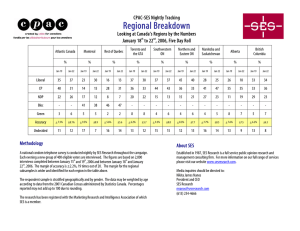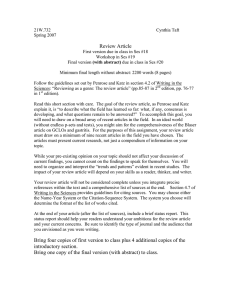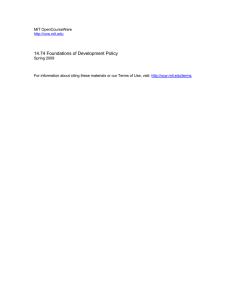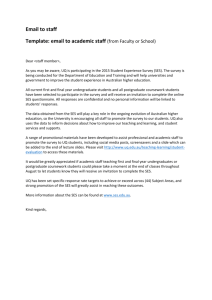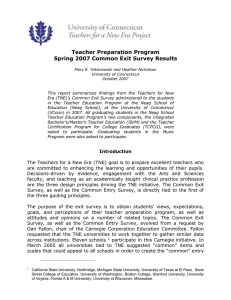This Survey was administered to TCPCG students in paper and... May 2007. Data was punched into Perseus by Asley.
advertisement
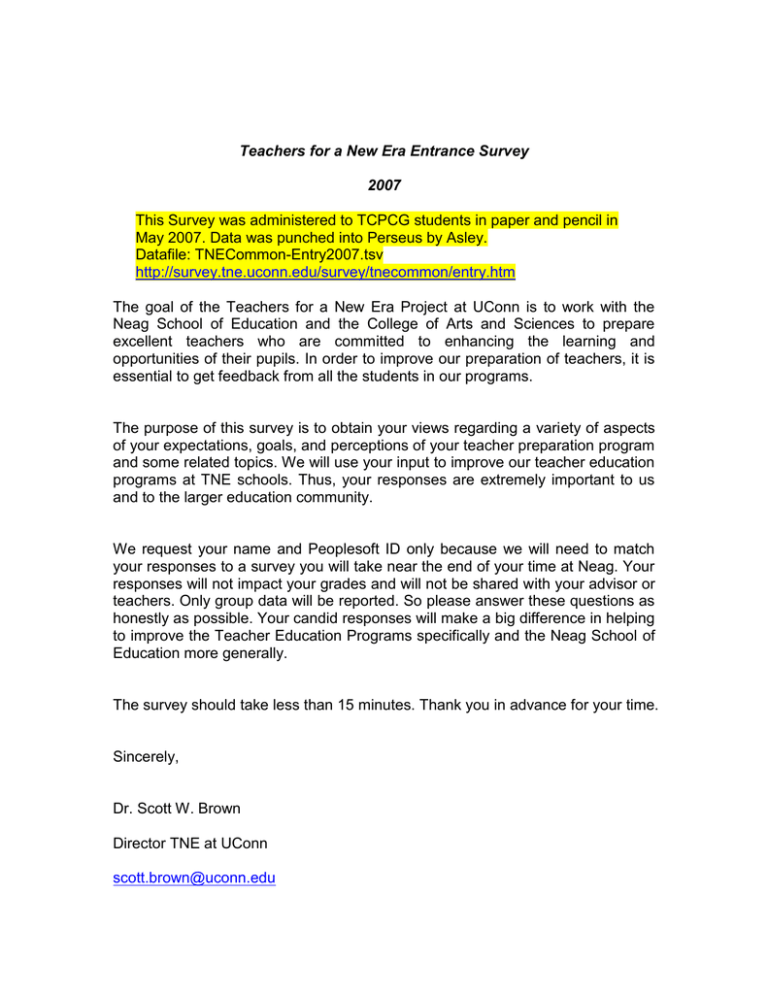
Teachers for a New Era Entrance Survey 2007 This Survey was administered to TCPCG students in paper and pencil in May 2007. Data was punched into Perseus by Asley. Datafile: TNECommon-Entry2007.tsv http://survey.tne.uconn.edu/survey/tnecommon/entry.htm The goal of the Teachers for a New Era Project at UConn is to work with the Neag School of Education and the College of Arts and Sciences to prepare excellent teachers who are committed to enhancing the learning and opportunities of their pupils. In order to improve our preparation of teachers, it is essential to get feedback from all the students in our programs. The purpose of this survey is to obtain your views regarding a variety of aspects of your expectations, goals, and perceptions of your teacher preparation program and some related topics. We will use your input to improve our teacher education programs at TNE schools. Thus, your responses are extremely important to us and to the larger education community. We request your name and Peoplesoft ID only because we will need to match your responses to a survey you will take near the end of your time at Neag. Your responses will not impact your grades and will not be shared with your advisor or teachers. Only group data will be reported. So please answer these questions as honestly as possible. Your candid responses will make a big difference in helping to improve the Teacher Education Programs specifically and the Neag School of Education more generally. The survey should take less than 15 minutes. Thank you in advance for your time. Sincerely, Dr. Scott W. Brown Director TNE at UConn scott.brown@uconn.edu Please Start Here Q. Name First Name: ___________________ ______________________ Last Name: Q. Date Date (MM / DD/ YY): _______________ Q. PeoplesoftID Peoplesoft ID: ________________________ 1. What Teacher Education Program are you entering? IB/M TCPCG Music A. Background Questions -- ALL Students This section asks about your educational background prior to entering the Neag School of Education. 2. What type of high school did you graduate from? Charter/magnet Home-schooled International School Private (non-religious) Private (religious or parochial) Public 3. How would you describe the location of your high school? Rural Suburban Urban 4. On average, what was the socio-economic status (SES) of the students in your high school? Low SES Middle SES High SES 5. How would you describe the racial composition of your high school? Primarily students of color A mix of both students of color and white students Primarily white students 6. How you describe your high school in terms of its overall achievement level? A low achieving school An average achieving school A high achieving school TCPCG students ONLY (all other students, please skip to section B. Teacher Education Program) 7. What undergraduate institution did you graduate from? ___________________________________ 8. Please indicate which response best describes your undergraduate degree. (Please check only one). Bachelor of Arts (BA or AB) Bachelor of Science (BS) Bachelor of Education (BEd) Bachelor of Arts and Science (BA and BS) Bachelor of Science in Nursing (BSN) Bachelor of Fine Arts (BFA) Other (Specify) ___________________________________ 9. Please indicate the response that best describes your undergraduate major(s). (Please check all that apply). Arts (e.g., Fine Arts, Drama, Music, Design) Biology Business or Professional studies (e.g., Agriculture, Architecture, Law) Chemistry Education Engineering or Computer Science English (e.g., English Literature or Composition, Communications or Journalism) Ethnic or Global Studies (e.g., African-American or Latin-American Studies) Foreign Languages Geology or Earth Science General Studies or Other Interdisciplinary Studies (e.g., Liberal / Family Studies) Mathematics (e.g., Mathematics or Statistics) Other Humanities (e.g., History, Philosophy, Religious Studies) Physics Psychology Social Sciences (e.g., Economics, Sociology, Anthropology, Political Science) 10. In what year did you receive your bachelor's degree? ___________________________________ 11. What was your final, overall grade point average for your undergraduate degree (on a 4.0 scale)? ___________________________________ B. Teacher Education Program -- ALL STUDENTS We would like to learn more about your goals and intentions while you are here at the Neag School of Education. 12. Which pupil level(s) are your intended focus in the Teacher Education Program. (Please check all that apply). Early childhood Elementary school Middle school High school 13. Do you plan to have a subject area specialty? Yes No 14. If you plan to have one or more subject area specialties, please place an “X” next to each one from the list below. (Please check all that apply) Bilingual; English Language Learners; English as a Second Language English Foreign Language Math Music Science Special Education Social studies Agricultural Education Other (specify) ___________________________________ 15. If you plan to major outside of education, please indicate it/them below. (Please check all that apply) Arts (e.g., Fine Arts, Drama, Music, Design) Biology Business or Professional studies (e.g., Agriculture, Architecture, Law) Chemistry Engineering or Computer Science English (e.g., English Literature or Composition, Communications or Journalism) Ethnic or Global Studies (e.g., African-American or Latin-American Studies) Foreign Languages Geology or Earth Science General Studies or Other Interdisciplinary Studies (e.g., Liberal / Family Studies) Mathematics (e.g., Mathematics or Statistics) Other Humanities (e.g., History, Philosophy, Religious Studies) Physics Psychology Social Sciences (e.g., Economics, Sociology, Anthropology, Political Science) 16. If you plan to minor outside of education, please indicate it/them below. (Please check all that apply) Arts (e.g., Fine Arts, Drama, Music, Design) Biology Business or Professional studies (e.g., Agriculture, Architecture, Law) Chemistry Engineering or Computer Science English (e.g., English Literature or Composition, Communications or Journalism) Ethnic or Global Studies (e.g., African-American or Latin-American Studies) Foreign Languages Geology or Earth Science General Studies or Other Interdisciplinary Studies (e.g., Liberal / Family Studies) Mathematics (e.g., Mathematics or Statistics) Other Humanities (e.g., History, Philosophy, Religious Studies) Physics Psychology Social Sciences (e.g., Economics, Sociology, Anthropology, Political Science) 17. What aspect of your preparation at UConn do you think will be most valuable to your career as a teacher? ________________________________________________________ ______ ________________________________________________________ ______ ________________________________________________________ ______ 18. What aspect of your preparation as a teacher are you most concerned that you will not be able to get from UConn? ________________________________________________________ ______ ________________________________________________________ ______ ________________________________________________________ ______ C. Classroom Teaching -- ALL Students We would like to learn more about how prepared you feel to begin teaching. We know that most of you have not had teaching experience, but we imagine that you may still feel more ready for some aspects of teaching than others. We would like to know more about these differences to help prepare our classes for you. 19. How confident are you to: a) Provide stimulating lessons for students b) Motivate students to participate in academic tasks c) Change the way to present material to accomodate the learning needs of all students d) Create learning experiences that are meaningful to students e) Know what procedures to follow if you believe a student has a disability f) Implement a variety of teaching strategies to reach students who are not native English speakers g) Teach even the most challenging students h) Effectively address classroom management issues i) Get along well with students who struggle with behavioral issues in school j) Facilitate learning for all of your students k) Adapt curriculum to accomodate individual differences l) Develop a strong rapport with your students m) Teach students with different cultural backgrounds from your own n) Integrate educational technology into your lessons o) Effectively teach special education students p) Respect cultural backgrounds different from your own q) Use effective classroom assessment strategies r) Use formalized assessment (i.e., CMT, CAPT, norm-referenced) results s) Develop a strong rapport with parents of your students t) Use computers effectively in the classroom u) Help your students better learn to use technology v) Know all the content that you will be required to teach to your students Not at confident Slightly confident Somewhat confident Quite confident Extremely confident 20. Please rank the following items from 1 to 3 (where 1 = your most important priority as a teacher and 3 = your least important priority as a teacher). Having a positive personal relationship with your students Helping your students learn the required content Motivating your students to be engaged in school 1 2 3 21. Please rank the following items from 1 to 5 (where 1 = your strongest skills or qualities as an educator and 5 = your least strong skills or qualities as an educator). Ability to establish rapport with students 1 Classroom management skills 2 Command of content knowledge 3 Lesson planning skills 4 Lesson implementation skills 5 D. Future Teaching Plans -- ALL Students We would like to get a better sense of your future teaching plans. Please describe the type of school that you would most like to teach at for the majority of your career by selecting the most appropriate answer. 22. How would you describe the location of this school? Rural Suburban Urban 23. On average, what would be the socio-economic status (SES) of the students in this school? Low SES Middle SES High SES 24. How would you describe the racial composition of this school? Primarily students of color A mix of both students of color and white students Primarily white students 25. How you describe this school in terms of its overall achievement level? A low achieving school An average achieving school A high achieving school Please describe the type of school where you think you will actually end up teaching for the majority of your career by selecting the most appropriate answer. 26. How would you describe the location of this school? Rural Suburban Urban 27. On average, what would be the socio-economic status (SES) of the students in this school? Low SES Middle SES High SES 28. How would you describe the racial composition of this school? Primarily students of color A mix of both students of color and white students Primarily white students 29. How you describe this school in terms of its overall achievement level? A low achieving school An average achieving school A high achieving school 30. For how many years do you think you will teach during your career? _____ years E. Demographic Information -- ALL Students 31. Please select your gender: Female Male 32. Please select the race/ethnicity that best describes you. American Indian or Alaskan native Asian / Pacific Islander Black or African American Hispanic American White/Caucasian Multiple ethnicity / Other, please specify: ___________________________________ 33. What is your date of birth? ___ / ___ / ___ ( MM / DD/ YY ) 34. Please select the primary language spoken in your childhood home. Chinese English French German Korean Spanish Other, please specify: ______________________________________ 35. Please select the highest level of education attained by your mother. Did not attend school Some elementary school Completed elementary school Some middle school Completed middle school Some high school Completed high school Some junior/community college Completed junior/community college Some college Completed college Some graduate school Completed graduate school 36. Please select the highest level of education attained by your father. Did not attend school Some elementary school Completed elementary school Some middle school Completed middle school Some high school Completed high school Some junior/community college Completed junior/community college Some college Completed college Some graduate school Completed graduate school Q. comments If you have any other comments or questions regarding this survey that you would like to share with us, please do so in the space provided below: ________________________________________________________ ______ ________________________________________________________ ______ ________________________________________________________ ______ ________________________________________________________ ______ ________________________________________________________ ______ Thank you very much for providing us with this important information. If you have any questions or would like to learn more about Teacher for a New Era you may write in the space below or contact us on the web at www.tne.uconn.edu. Best of luck with the coming school year!
